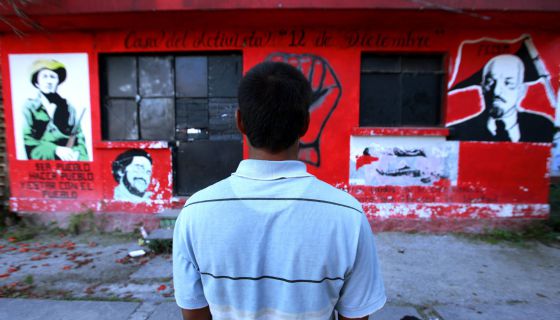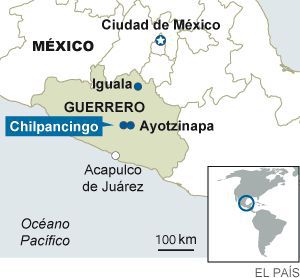This article was originally published
at:
http://internacional.elpais.com/internacional/2014/10/28/actualidad/1414457377_371609.html
The violence in the state corresponds to a long history of guerrillas, confrontations, chiefdom and poverty
Verónica Calderón México 8 NOV 2014 - 01:05 CET
A student from the Ayotzinapa teacher-training college. To the right, an image of Lucio Cabañas. / José Méndez (EFE)
The 43 Mexican student teachers assassinated the last 26th of September belong to the Rural Teacher-Training School of Ayotzinapa, a tiny mountain community of scarcely a hundred inhabitants in Guerrero, in the south of Mexico and one of its poorest states. But it isn't the first time that the word has resounded in the ears of the country. The Mexican guerrilla, Lucio Cabañas, also graduated from that Rural Teacher-Training School, from Ayotzinapa. Cabañas founded the Party of the Poor, an armed group that in 1974 kidnapped the senator – who became a governor a year after - Rubén Figueroa Figueroa. The event, from 40 years ago, recalls that Guerrero bears a long history of poverty, forget, chiefdom and violence: a cocktail that the massacre in Iguala, ordered by the municipal mayor himself according to the investigations, has left bare.
At least 14 of the 80 municipalities of Guerrero have already been taken over by federal forces in the month that has passed since the tragedy, but the violence has gone up for a long time. Its winding geography of mountains doesn't make access to the towns easy. Meanwhile a quarter of its 3.4 million inhabitants live in Acapulco, that have the third highest rate of homicides in the world, only surpassed by San Pedro Sula (Honduras) and Caracas (Venezuela), according to the figures of the Citizen's Council for Security and Peace. Not even talking about the other towns. The crossing of the Sierra Madre and those of the south turn into paths that appear impregnable at a distance and fertile terrain for a network of chiefdoms that are decades old.
You only have to follow the trail of some of its leaders to understand the reach of that network of chiefdoms and their reason for existence. The poverty that extends to the other 80 municipalities of Guerrero oblige the majority of its inhabitants (men, women, children) to wander all over the country to work as harvesters in the crops of tomato in Sinaloa, apples in Chihuahua or chilli peppers in Guanajuato and, together with their neglible wages, surviving thanks to federal subsidies managed, on many occasions, but their regional leaders.
The case of Cabañas and Figuero is emblematic. Their confrontations is one of the episodes of the Dirty War in Mexico: the period of political and military repression carried out in the sixties and seventies whose objective was dissolving armed and political opposition movements against the dominant party of the country, the PRI1.
Cabañas' movement initiated demonstrations, at the start peaceful, to denounce the poverty of the populations and the confrontation, each time greater, between the peasants and the regional chiefs. “The chiefs have been the people that do everything, make themselves authorities, buy cheap harvests, manage the economy as they please. The governments relied on the chiefs for nothing other than the promotion of voting, they were the leaders that used to do everything: but that brought as a consequence difficulties, because the rest of the people want to develop themselves, they want to study, they want to get better health-wise, they want that their family might get ahead”, affirms Evaristo Castañón, peasant from El Quemado, a community from Atoyac, 100 kilometres from Acapulco, in an investigation by the George Washington University.

Cabañas, that carried out guerrilla activities for at least 10 years, ordered the kidnapping of Figueroa (then a senator and in a political campaign for the governorship of Guerrero) the 30th of May 1974. The event shook the country. He was liberated in a military operation on the 8th of September of that same year, but the U.S. embassy doubted that it might not have paid a ransom, such as has been demanded by Cabañas, according to a cable from the State Department revelled by Wikileaks in 2011. Figueroa became the governor of his state in April 1975. By then, Cabañas had already died in a conflict with the Mexican army in December of the previous year.
Upon the arrival of Vicente Fox, from the conservative National Action Party (PAN) in 2000, the Special Prosecution's Office for Past Political and Social Movements was created in 2002, to clear up the disappearances, assassinations and repression that occurred during that period. Rubén Figueroa Figueroa was filled with pride that they might have given him the nickname The Tiger of Huitzuco, and his son, Rubén Figueroa Alcocer, followed in his footsteps in politics and also became governor of the state until another scandal obliged him to leave the position. The massacre of Aguas Blancas, occurred in 1995. A group of peasants, that were walking to a demonstration to demand freedom for a rural leader, were ambushed by the police. Seventeen died and 21 were injured. Figueroa's initial version was that the officers “had been attacked first”. A video also showed that what happened had been an ambush against unarmed civilians. The successor of Figueroa? Ángel Aguirre Rivero, that later would decide to insist in returning to hold the position, now through the ballot box and in the ranks of another party, now the PRD2, in 2010. He held the post until Thursday the 23rd of October, obliged by the pressure of another massacre: this time the one of Ayotzinapa.
The loose ends finish with the recently named interim governor of Guerrero: Salvador Rogelio Ortega. In his inauguration speech, Ortega mentioned his mother, Rosaura Martínez, also a teacher. The journalist Roberto Ramírez Bravo remembers that, in the times of the dirty war, Ortega was detained by the police and illegally held prisoner. His mother was to receive an award for 20 years of work as a teacher at the hands of the governor, Rubén Figueroa Figueroa, The Tiger of Huitzuco himself. She refused to receive the diploma and faced him head-on. Ortega was let go a little afterwards.
1PRI
- Institutional Revolutionary Party, Mexican political party. Its
modern policies of neo-liberalism and privatization have been
characterized as centrist or even as Centre-right
2
The Party of the Democratic Revolution (Spanish: Partido
de la Revolución Democrática, PRD) is a social democratic
political party in Mexico that advocates for democracy.
No comments:
Post a Comment